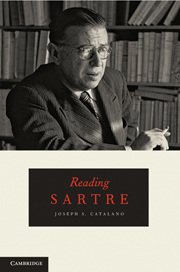Book contents
- Frontmatter
- Contents
- Preface
- Acknowledgments
- Works Frequently Cited
- PART ONE A RETROSPECTIVE OVERVIEW
- 2 Saint Genet: Actor and Martyr
- 3 The Critique of Dialectical Reason
- 4 Being and Nothingness
- PART TWO THE WORKS THEMSELVES
- 5 Being and Nothingness
- 6 The Critique of Dialectical Reason
- 7 Saint Genet: Actor and Martyr
- 8 The Family Idiot
- 9 The Family Idiot
- Afterword: Madame Bovary
- Index
- References
6 - The Critique of Dialectical Reason
Published online by Cambridge University Press: 05 June 2012
- Frontmatter
- Contents
- Preface
- Acknowledgments
- Works Frequently Cited
- PART ONE A RETROSPECTIVE OVERVIEW
- 2 Saint Genet: Actor and Martyr
- 3 The Critique of Dialectical Reason
- 4 Being and Nothingness
- PART TWO THE WORKS THEMSELVES
- 5 Being and Nothingness
- 6 The Critique of Dialectical Reason
- 7 Saint Genet: Actor and Martyr
- 8 The Family Idiot
- 9 The Family Idiot
- Afterword: Madame Bovary
- Index
- References
Summary
The French publisher Gallimard, who had published the French edition of Being and Nothingness in 1943, published the first volume of the Critique of Dialectical Reason in1960. Within the seventeen years separating these two books, Sartre produced at least twenty-two works, mostly, but not exclusively, through Gallimard – novels such as The Age of Reason, plays such as No Exit, essays such as What is Literature, and philosophical biographies such as Saint Genet.
The full title of the English edition of the Critique, which was brilliantly translated by Alan Sheridan-Smith and edited by Jonathan Rée, is Critique of Dialectical Reason, Volume 1: Theory of Practical Ensembles. This work was to be followed by a second volume, which was never completed; it was, however, published posthumously by Gallimard in 1985 and lucidly translated in 1991 by Quintin Hoare as Critique of Dialectical Reason, Volume 2: (Unfinished) The Intelligibility of History. The relation between the two volumes was to be indicated by the subtitles, but I will later explain why I am dubious about the usefulness of the subtitle of Critique 2. Still, the overall project is clear, namely, Sartre's attempt to show how we have individually and collectively forged our history, and how we are capable of understanding it.
The first volume traces the ways our practical involvement with the world alters it into a quasi tool. We do not merely use this forged massive structure; it also uses us.
- Type
- Chapter
- Information
- Reading Sartre , pp. 113 - 136Publisher: Cambridge University PressPrint publication year: 2010



